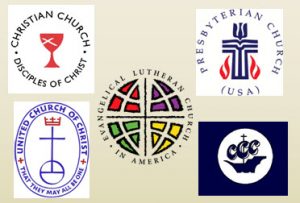 Christian Piatt includes denominations on his list of five things that are holding Christianity back. He suggests that with so many denominations the “distinction from others like them are so minute that even the members within a given denomination can’t tell you what makes them unique.” Additionally, he argues that “with the trend toward personal and local autonomy taking hold in many Christian communities, there is increasingly less of a reason to keep such hierarchic corporate structures on life support any more.”
Christian Piatt includes denominations on his list of five things that are holding Christianity back. He suggests that with so many denominations the “distinction from others like them are so minute that even the members within a given denomination can’t tell you what makes them unique.” Additionally, he argues that “with the trend toward personal and local autonomy taking hold in many Christian communities, there is increasingly less of a reason to keep such hierarchic corporate structures on life support any more.”
Reality Check
Piatt mentions that there are now some 38,000 unique Christian denominations (a widely accepted number that offers a solid sociological overview of diversity within Christianity). Imagine deciding to follow the way of Jesus, then seeking to find the ideal denomination in which to grow as a disciple. Could you ever adequately sift through a data set that contained 38,000 options? Of course, in reality, the options are even more numerous since many congregations look nothing like or follow the official stances of their respective denominations in some areas while ignoring them in other areas.
The idea of denominations made sense for a specific era in human history. These thoroughly modern institutions did quite a bit of good, and strategically advanced the Way of Jesus for a number of years. Modernity will soon be no more. The world is increasingly a postmodern place, and entities that try to function in modern manners will increasingly become irrelevant.
Personal Disclaimer
As I write this blog post I am quite aware that on the home page of this site my profile indicates that I am post-denominational. I recognize that my own experiences play a rather significant role in how I view this topic.
Since graduating from seminary, every church I have served has been affiliated with a denomination. In some cases that tie was strong, but in most the link was quite limited. The denominations/traditions include Christian Church (Disciples of Christ), Congregational (NACCC), Lutheran (ELCA), Presbyterian (PCUSA), and the United Church of Christ.
I have also earned three theological degrees from schools associated with three different traditions (none of which match any of the denominations mentioned above!), and worked in consultative capacities with congregations affiliated with dozens of additional denominations.
I have also been asked to continue my education to be in good standing with multiple denominations. In each case that experience included successfully completing a seminary/graduate level course in the history and polity of the respective denomination.
So What?
Very few people choose to visit a church because it is affiliated with a given denomination. Most, however, do have reasons that they use to filter what churches they will visit or at least consider visiting. Put differently, denomination ranks rather low in importance when people are considering joining a community of faith (and is less and less important the younger the age of the individual seeking a church home).
Very few denominations have engaged in significant strategic change that has included re-visioning their role for a postmodern world. Even fewer have emerged during the postmodern era within a postmodern framework. The modern institution will either undergo radical changes such that it will be more dissimilar than like the denominations that worked well through the middle of the twentieth century.
Very few of the largest or fastest growing churches look like the traditional local congregation with strong denominational affiliation. In reality, both lists are dominated by churches characterized as nondenominational or interdenominational.
A few years ago a group of leaders in one denomination labeled their own denomination “deathly ill.” In reality, the idea of denominations itself is deathly ill.
The future of the church does not depend on denominations — at least not denominations as they were constructed and have largely functioned in the modern era.
- Is your local congregation affiliated with a denomination or Christian tradition? If so, how strong is that tie?
- Are you familiar with other forms (other than denominations) of voluntary association with other churches or groups of churches? In what ways does your local congregation participate in such or in what ways do you feel it should?
- If you could reinvent the idea of denomination (taking the best attributes of what it was during the era when those attributes resonated with a majority of constituents and either remaking them for a new era or replacing them with the best attributes of this era) how would you begin? Have you been a part of conversations about how to remake all denominations or how to re-vision your own denomination?